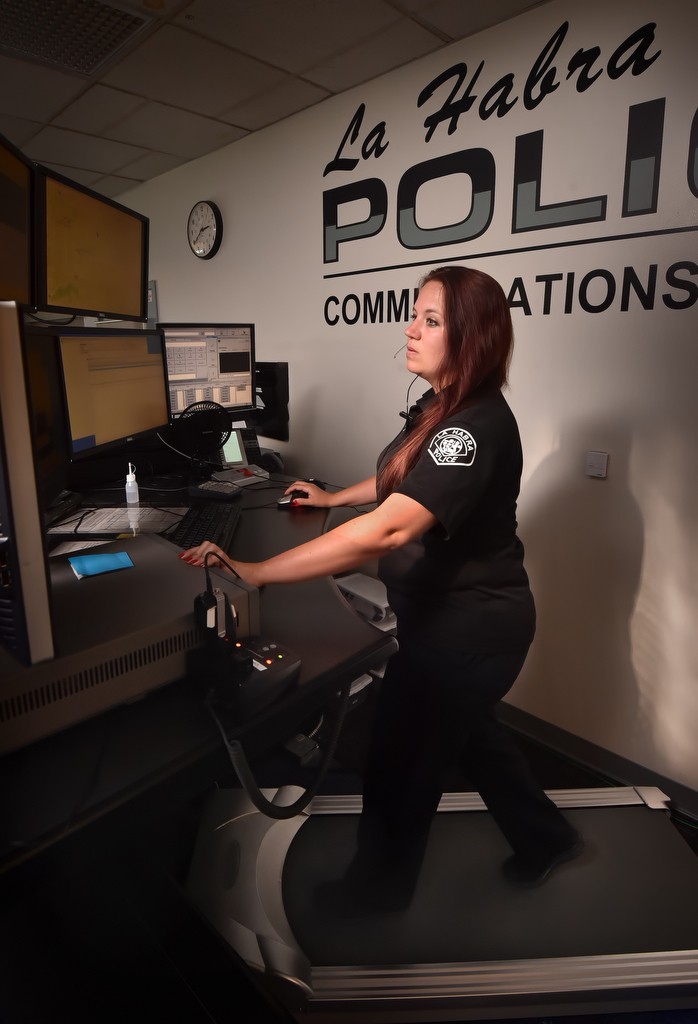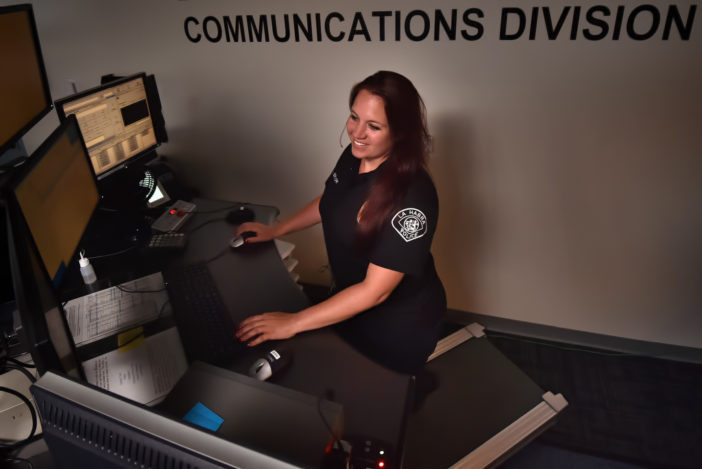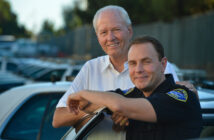Twelve hours a day in a low-lit room staring at several screens is hard on the body and mind.
On a busy shift, La Habra PD dispatchers can go many hours without getting up.
“I sat in those chairs for 20 years, and it takes a toll,” said La Habra PD Communications Supervisor Cynthia Gulley.
That’s why Gulley proposed finding a way to encourage a healthier lifestyle in the department’s communications department.
The department, in May, turned one of the dispatch areas into an active work station with a treadmill employees can walk on and work from at the same time.
“I had to do a lot of research before purchasing this and found out other agencies have them too,” she said. “Tustin has one, as well as the (Orange County) Sheriff’s Department.”
“There is absolutely no interruption to service whatsoever.”
The dispatchers all use wireless headsets to answer calls and the treadmill maxes out at 2 miles per hour.
They can take calls and communicate with officers all while getting a much-needed break from the monotony of sitting in a chair.
If a major emergency happens, there is a safety cord that will stop the treadmill should the dispatcher need to jump off, Gulley said.
Communications Operator Mandy Enslow, who started with the department about 18 months ago, said she makes an effort to log four miles every shift she works.
“Aside from the walking, getting up and moving around, it feels like a mental break,” she said. “It can be hard to sit and stare at a screen for so long and not move.”

Amanda Enslow, communications operator for the La Habra PD, keeps active as she walks on a treadmill while taking calls in the 911 Communications Division dispatch center.
Photo by Steven Georges/Behind the Badge OC
In recent years, there have been several studies cautioning sedentary workers about the risks of failing to get up and move around during the work day.
Research from the Mayo Clinic links long periods of sitting to a variety of health concerns including obesity, heart disease, metabolic syndrome and high blood sugar.
The study also found hitting the gym after a long day of sitting doesn’t fully offset the damage of hours at a desk.
It’s imperative, researchers say, to get up and move around throughout the work day.
But for dispatchers, that’s not so easy.
There is no taking a break to walk around the department when manning the screens, and to make it even more difficult on the body, their shifts run 12 hours, not eight like many other jobs.
Having wellness programs in place, such as the walking work station, helps promote staying active and eating better.
“If you can get up and move around, you become more conscious of what you’re putting in your body,” Gulley said. “There can be a lot of stress eating with this job, but now we’re making healthier choices.”
And dispatchers encounter a lot of stress on the job.
From baby not breathing calls to officer pursuits, they are exposed to a level of stress not found in most other desk jobs.
“I have been to trainings where they talk about the liver and kidney issues because of the adrenaline spikes we experience,” Gulley said. “Your adrenaline will shoot way up high (on a call) and then drop.
“It wreaks havoc on your body.”
Having the treadmill, Gulley said, helps dispatchers better handle the emotional and mental tension they experience.
“We can’t leave to relieve stress,” she said. “To be able to get up and release some endorphins is necessary.
“For me, that’s the whole point. Dispatchers should be able to get up and do something while they’re working to relieve that stress.”
It’s a concept that has been well-received in La Habra PD’s communications operators: The treadmill work station has been used every day since it was introduced.
 Behind the Badge
Behind the Badge



